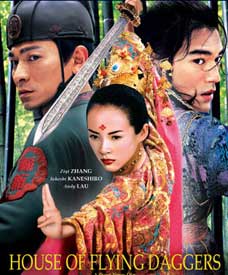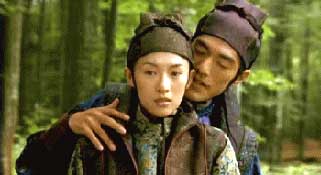 What luck for wuxia fans that there's a world-class director of the quality of Yimou Zhang -- director of arthouse hits Red Sorghum (Hong gao liang, 1987) & Raise the Red Lanterns (Da hong deng long gao gao gua, 1991) -- who has decided to invest all his refined artistry into all-out kung fu historicals. What luck for wuxia fans that there's a world-class director of the quality of Yimou Zhang -- director of arthouse hits Red Sorghum (Hong gao liang, 1987) & Raise the Red Lanterns (Da hong deng long gao gao gua, 1991) -- who has decided to invest all his refined artistry into all-out kung fu historicals.
The frequent beauty of costume & environment in wuxia is trebled in The House of Flying Daggers (Shi mian mai fu, 2004), for one of the great visual treats in all cinema.
Add to that a variety of stunning martial arts sequences that rise well above the norm, & a degree of conviction that brings the viewer fully into this other world, & what you end up with is the true revitalization of a genre that had fallen into predictable cliche, excessive fantasy, & mere noise striving to disguise childish insipidity. Thank you Yimou Zhang, thank you, thank you.
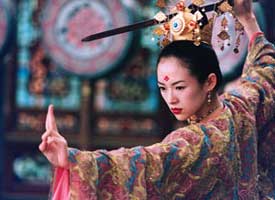 Leading up to this movie, the only film that competes with The House of Flying Daggers' perfection would be the same director's Hero (Ying xiong, 2002), & Ang Lee's Crouching Tiger, Hidden Dragon (Wo hu cang long, 2000). Leading up to this movie, the only film that competes with The House of Flying Daggers' perfection would be the same director's Hero (Ying xiong, 2002), & Ang Lee's Crouching Tiger, Hidden Dragon (Wo hu cang long, 2000).
House of Flying Daggers stars two absolutely beautiful actors as the main hero/swordsmen: the half-Taiwanese half-Japanese Takeshi Kaneshiro from Chungking Express (Chung hing sam lam, 1994); & superstar Andy Lau from so many films including The Duel (kuet chin chi gam ji din, 2000) & The Three Swordsmen (Dao jian xiao, 1994).
But the film's central delight is its array of dagger-throwing women & in particular the blind martial heroine Mei played by Zhang Ziyi who should already be familiar to western viewers from Hero, Memoirs of a Geisha (2005), & Crouching Tiger.
For sheer visual beauty I can never forget Zhang Ziyi's "long sleeve dance" in which she uses her sleeves as bullwhips to beat the pole-mounted drums surrounding her dance floor.
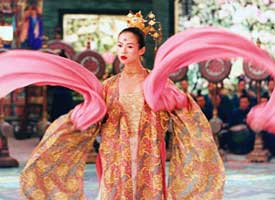 Or the extensive martial arts sequence in the bamboo forest with bow & arrow, throwing-daggers, kung fu leg & arm boxing, & swordplay choreographed with unimaginably beautiful swordsmen & swordswomen to look more like a medieval war-scroll illustrating a violent poem rather than the usual comic book spread. Or the extensive martial arts sequence in the bamboo forest with bow & arrow, throwing-daggers, kung fu leg & arm boxing, & swordplay choreographed with unimaginably beautiful swordsmen & swordswomen to look more like a medieval war-scroll illustrating a violent poem rather than the usual comic book spread.
Set during the troubled decline of the Tang Dynasty in 859, rebels have formed their own martial societies throughout China, & the House of Flying Daggers is one of the most powerful. Government officials have attempted to suppress this secret society to small avail, despite the heroic efforts of Leo & Jin (Andy Lau & Takeshi Kaneshiro).
The Flying Daggers are led by blind Mei, daughter of the assassinated leader of the Flying Daggers, & hellfire to do battle with in spite of her blindness.
Captain Jin goes undercover pretending to be a rebel, or at least a freelance chivalrous swordsman, to liberate Mei from prison & get her safely across the county to the Flying Daggers' headquarters. They inevitably fall in love, despite the opposing duties & intentions that separate them.
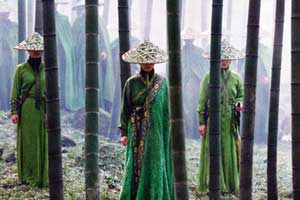 I love martial cinema & if this were the sort of film usually encountered under the genre designation wuxia, then just about everyone on earth would love martial cinema as much as I do. I love martial cinema & if this were the sort of film usually encountered under the genre designation wuxia, then just about everyone on earth would love martial cinema as much as I do.
That is not to say this film is utter perfection, but for my tastes, any criticism I set into these paragraphs are nitpiks only.
Some of my fellow wuxia fans were annoyed by the excessive pictoriality & slow pacing, which I wouldn't personally fault, & by the "love story" element which does get a bit sappy, admittedly. If most everything about this film is (to my judgement) better than the usual period kung fu epic, the story values are no great improvement, but merely an adequate framing for the visuals.
If a viewer attempts to take the sentimental storyline seriously, then the ending is highly unsatisfactory because it reaches for such "serious" heights of emotion that it becomes accidentally parodic. The degree of duplicity between characters imitates one of the common faults of lavish wuxia films generally, adding layer upon layer of needless convolutions that don't actually extend characterization nor improve the plot.
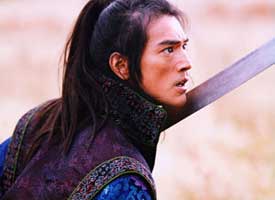 The "negatives" about the film would be, then, that underneath all the stunning beauty is a hollow bag. There's no sense of valuable meaning like there is in King Hu's Touch of Zen (Hsia nu, 1969) & no mystical high spot like there is for Crouching Tiger. The "negatives" about the film would be, then, that underneath all the stunning beauty is a hollow bag. There's no sense of valuable meaning like there is in King Hu's Touch of Zen (Hsia nu, 1969) & no mystical high spot like there is for Crouching Tiger.
Some Chinese critics were very hard on the film because of this very emptiness, as the director's earlier films have had, beneath their surface, meaning & intelligence. In Yimou Zhang's defense, he was here out to make a true wuxia, not a film of intellectual consequence posing as wuxia.
Also I don't usually swoon to wire-fu because I prefer down-to-earth choreography that I can believe really could be achieved by superior warriors (hence I tend to prefer the great samurai films over the great kung fu films, as samurai classics are less inclined to ignore the laws of physics). Yet House of Flying Daggers exaggerates martial extremes with such elegance & was so amazingly beautiful, I was very happy to be fooled, for the duration, into believing there might be some way that acrobatic fighters could zip around the upper realms of a bamboo forest just as shown.
And for crine out loud, I watch so many of these types of films, & House of Flying Daggers is hundreds of times better than 99.9% of what's out there. To root around for faults seems a bit churlish, so I will shame-facedly stop looking for lapses of perfection in what is overall an extremely wonderful film.
copyright © by Paghat the Ratgirl
|
